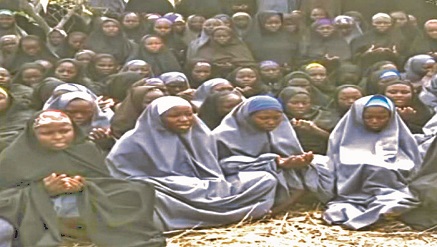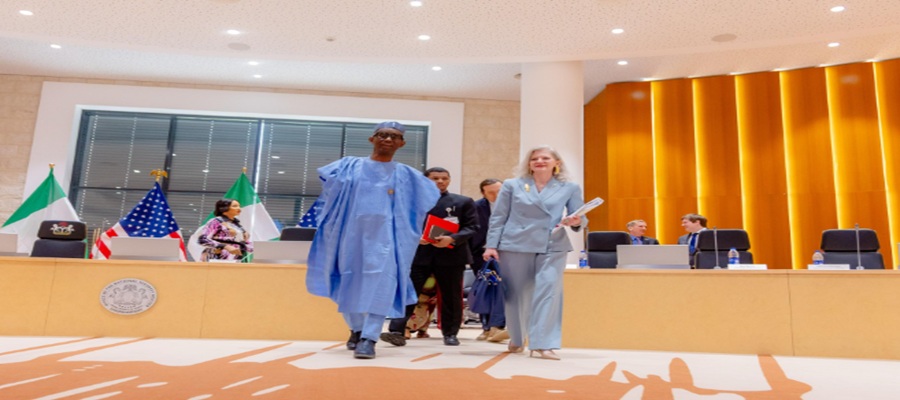General News
Chibok Parents, Leaders Fight Over FG’s N100m Cash Gift

Parents of the abducted Chibok schoolgirls and the community’s leader are at loggerheads over the sharing of the N100m cash gift allegedly given to the parents of the students by President Goodluck Jonathan.
The money was allegedly given by the President after a meeting in Abuja on July 22.
But Dr. Reuben Abati , special adviser to the President on Media and Publicity, denied the report that money was given to the Chibok delegation.
But the BBC Hausa Service said that the sharing formula for the N100m cash gift sparked a serious disagreement between some of the parents and leaders of the Chibok community in Abuja as the parents complained of being shortchanged in the sharing of the money.
There were reports that the Presidency allegedly released the fund to the leaders of the Chibok community in Abuja, as a palliative measure, for onward distribution to parents of the kidnapped girls after the meeting.
However, trouble started when some of the parents who felt cheated with the sharing of the largesse accused the leadership of the community in Abuja of shortchanging them.
One of the parents told BBC Hausa Service: “I got only N200,000 out of the said N100m allegedly received by our leaders in Abuja. Some of us got N300, 000 and some less than that,” he said.
The aggrieved parent said that he was not happy with the way the money was shared as he felt shortchanged.
“Our leaders in Abuja are using the girls to enrich themselves. In fact, some of the parents were screened out of the entourage by the Chibok leaders in Abuja. Many of them are residents of Abuja, not parents of the kidnapped girls,” he said.
Another parent, who was screened out of the delegation that visited the President, said he got only N7,000 out of the money that was shared.
“I was at the farm when they brought the N7,000 to my house and I collected it. Some of us got even less, N300 and below,” he said. aggrieved parents stressed that they were not selling their daughters and that the money from the President just came to them without their asking or expecting it.
One of the community leaders, Pobu Bitrus, who is also a member of the House of Representatives, was at the meeting with the President.
Bitrus told the BBC that after the meeting with the President, money was distributed to the parents in envelopes.
“After we met with the Presidency, the parents were given money in envelopes and that’s all. All other things they are saying about N100m, I don’t know about that,” he said.
Tsambido Abana, chairman of the community, described as false allegations that the money was shared among the parents and that some were short changed by the leadership of the association.
Abana, in a telephone interview yesterday, said there was no truth in the report that Presidential officials doled out N100m to the parents and the escaped girls that held a parley with the President.
He said: “There is no iota of truth in that report. I don’t even want to talk about it because I don’t know how such a story came about. The money that was shared to the parents was handled by presidency officials who gave out envelopes to the parents, so I was not involved in the sharing and I can’t say anything about it.”
In his reaction, Special Adviser to the President on Media and Publicity, Dr. Reuben Abati denied the report that money was given to the Chibok delegation.
“Nobody distributed any envelope after the meeting. The meeting was held in the Villa, a public place. After the meeting, the President left and the parents as well as the children went into their buses in the presence of the media,” he said.
According to him there was no time for money to be given after the meeting.
“The President is not part of will never do anything to bribe anybody. This issue is not about money. We are talking about human lives here.
“The allegation is completely wild. What they are claiming is unknown to the President. Whoever is claiming it should prove it because no such thing happened.
“The commitment of the President is to get the girls back safely. It is not about bribing anybody. This is a very serious matter and we will like to appeal to those who want to play politics with it, using all kinds of tricks to ridicule the efforts of the administration, to always appeal to their individual conscience and realise that what we are dealing with here is a very serious matter and not a matter of mischief,” he added.
Meanwhile, not fewer than eight persons were said to have been killed and a major bridge in Yobe State destroyed when gunmen suspected to be members of the Boko Haram sect attacked Katarko village on Monday, residents and a security official said.
According to reports, the gunmen, who came in large numbers, could not be matched by the soldiers at a check point about 300 metres away from the village.
“They came at 7:30pm,” said Lawan Ali, a resident of Katarko who spoke from Buniyadi, the headquarters of Gujba Local Government Area of the Yobe State, where he sought refuge after the attack.
“They stormed our village with some vehicles and many motorcycles, shooting and chanting Allahu Akbar (God is great).
“Some of them could be mistaken for solders because of their dressing which resembled that of the Nigerian soldiers. “The soldiers in Katarko had to flee after seeing the large number of the attackers.
“After attacking the village and killing about eight persons and injuring others who were not so lucky to escape, we later heard a thunderous explosion at the location of the bridge; we all fled into the bush. But in the morning, we found out that the bridge had been destroyed with bombs,” Lawan added.
Residents of the village lamented that with the destruction of the bridge, the village would be cut off from other part of Yobe State as the rain intensified.
The attack on Katarko village was the first on the community despite its proximity to Sambisa forest.
Abbas Gava, a member of the Nigerian vigilante group in Borno State, who also confirmed the incident, said he was communicating with his colleagues in the state on the incident.
The meeting took place after a meeting with the visiting Pakistani teenager, Malala Yusoufai, who champions the cause of girl-child education.
General News
Nigeria Treats Religious Violence as Attack on State – NSA Ribadu

National Security Adviser Nuhu Ribadu has said the federal government considers religious violence an attack on the Nigerian state, stressing that the protection of all citizens, regardless of faith, is non-negotiable.

According to presidential spokesperson Bayo Onanuga, Ribadu made the remarks in Abuja at the close of a US–Nigeria Joint Working Group session.
“Nigeria is a deeply plural society, and the protection of all citizens, Christians, Muslims, and those of other beliefs, is non-negotiable,” Ribadu said.
“Violence framed along religious lines is treated as an attack on the Nigerian state itself.”
In a follow-up post on X, Ribadu said the joint working group has recorded “tangible operational gains” in the fight against terrorism.
The working group was set up following Nigeria’s designation as a Country of Particular Concern (CPC) by US President Donald Trump, a label that often triggers policy actions aimed at ending severe violations of religious freedom.
At the meeting, Ribadu led Nigeria’s delegation, which included representatives from 10 ministries and agencies, while the US delegation, made up of eight federal agencies, was led by Allison Hooker, US under-secretary of state.
Ribadu said Nigeria-US security cooperation has moved from dialogue to action, resulting in the disruption of terrorist networks and transnational criminal groups. He also praised the US for supplying drones, helicopters, platforms, spare parts, and other support systems over the past five years.
Speaking at the session, Hooker said the US was committed to expanding its partnership with Nigeria, particularly on deterring violence against Christian communities.
“Today, we are here to discuss how we can work together to deter violence against Christian communities, prioritising counter-terrorism, insecurity, investigation of attacks, and holding perpetrators accountable,” she said.
She added that efforts would focus on reducing killings, forced displacement, and abductions of Christians, especially in Nigeria’s north-central states
General News
PalmPay User Shares Experience on Fintech Apps to Trust in Nigeria

For many Nigerians, fintech apps are judged by one simple question: Can I trust the platform? For Happiness, a young Nigerian entrepreneur, the answer manifested in the most defining moments of her life.

Trust Built Through Everyday Use
In 2025, Happiness relied on PalmPay to run her business, from receiving customer payments, paying vendors, and managing daily transactions. During PalmPay’s Hustle Grant Campaign, she joined thousands of small business owners hoping to win the N500,000 funding.
While she didn’t make the shortlist, the campaign gave her business something just as valuable: visibility. New customers discovered her brand, enquiries increased, and sales followed.
PalmPay didn’t just host a campaign; it created an ecosystem where small businesses could be seen and supported.
Just days later, Happiness’ life changed. On August 30, 2025, she lost her father. With this loss came challenges, especially payments. They tried transferring money through regular banks but were met with declined transactions. Happiness suggested using her PalmPay account and it was successful.
In a moment defined by loss and urgency, PalmPay cut through the chaos, proving that reliability isn’t a feature, it’s a lifeline. Happiness’ relationship with PalmPay didn’t stop at transactions. Through other management tools on the app, she learned to build discipline around her finances.
More Than an App, a Financial Partner
Beyond transactions, PalmPay’s tools helped Happiness build better money habits and financial discipline. Today, the brand continues to reward reliability through initiatives like its ongoing Premier Cool campaign, reinforcing a simple message: consistency should come with value.
The idea is simple: Purchase a bar of soap and stand a chance to get ₦10,000cash and other cash benefits.
It’s PalmPay’s way of saying that smart money habits deserve real value in return.
Why PalmPay Earns Trust
Life doesn’t give warnings before it tests you. When it does, you need a platform that doesn’t just usually work but always works.
For many users, PalmPay proves to be more than a payment app. It is a trusted partner powering ambitions, supporting users through defining life moments, while helping them bank smartly.
When it mattered most, PalmPay worked. To watch the full testimonial visit: @palmpayapp_ng
General News
Nigerians Target Self-Improvement, Business Startups in 2026 Google Data

Google Search data from the first two weeks of 2026 reveals Nigerians are prioritising ambition, self-growth, and entrepreneurial ventures as they embrace the new year with renewed drive for personal and professional excellence.

The data shows a 40 per cent spike in searches related to self-improvement and “becoming better”, reflecting a nationwide shift from mere resolutions to actionable plans across boardrooms, classrooms, and homes. Entrepreneurship leads the charge, with “how to start a business” topping “how to start” queries after an 80 per cent surge, alongside rising interest in blogging, podcasting, and YouTube channels to foster economic opportunities.
Personal development dominates, as searches for “how to be a better person” rose 20 per cent, extending to relationships with queries on becoming better lovers, partners, husbands, wives, and listeners. Health resolutions gain traction, with 40 per cent increases in “how to eat healthy”, “healthy diet”, and “how to meditate” underscoring commitments to physical vitality and mental wellness.
Skill mastery captivates diverse audiences, from “how to improve English” and communication skills to enhancing memory, credit scores, and even handwriting, while leisure pursuits spike in “how to get better at” chess, singing, running, Fortnite, and soccer. Top searches include “how to improve communication skills”, “how to be a better listener”, and entrepreneurial starters like “how to start a podcast”, painting a portrait of a nation honing edges for success.
Taiwo Kola-Ogunlade, Communications and Public Affairs Manager for West Africa at Google, described the trends as a “powerful reflection of Nigeria’s collective ambition”, affirming the company’s dedication to tools like Search and Gemini for guiding Nigerians toward prosperity

 General News3 days ago
General News3 days agoPalmPay User Shares Experience on Fintech Apps to Trust in Nigeria

 News3 days ago
News3 days agoStakeholders Demand Stronger Governance and Infrastructure to Drive Tech Adoption @ Lagos AI Summit

 General News3 days ago
General News3 days agoNigerians Target Self-Improvement, Business Startups in 2026 Google Data

 News3 days ago
News3 days ago35 Million Nigerians Face Acute Hunger in 2026, UN Warns

 General News3 days ago
General News3 days agoHow Inside Jobs and Policy Shocks Trigger Nigeria’s Rising Loan Crisis

 News20 hours ago
News20 hours agoAnambra Cuts Monday Pay to Kill Sit-at-Home

 E-Financial20 hours ago
E-Financial20 hours agoFirst Asset Management Receives Upgraded Ratings from Agusto &Co and DataPro

 General News20 hours ago
General News20 hours agoNigeria Treats Religious Violence as Attack on State – NSA Ribadu

























